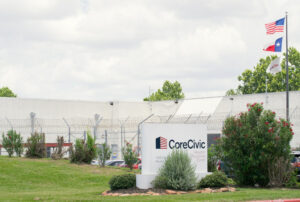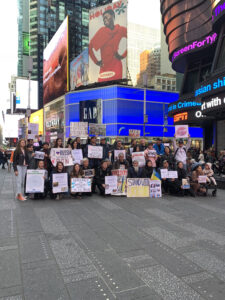The Hazards of Hillary

Hillary Clinton at the Democratic National Convention in July | Photo courtesy Damien Winter New York Times

At the Democratic Party’s convention this past summer, Hillary Clinton recited the words of John Wesley—the 17th century founder of her Christian Methodist denomination—during her acceptance speech, “Do all the good you can, for all the people you can, in all the ways you can, as long as ever you can.”
Judging from last night’s fiery debate, Clinton’s words may no longer seem relevant in a presidential race increasingly defined by political muckraking than any appeal to morality. But calls to a greater purpose have long underpinned Clinton’s political ambitions. “We need a new politics of meaning,” began her 1993 speech at the University of Texas at Austin, “We need a new ethos of individual responsibility and caring. We need a new definition of civil society.” Clinton has consistently argued that economic growth, political democracy and freedom are not enough to give meaning to our individual lives. In her world, so strongly influenced by her Methodist upbringing, caring for others is what it means to be human.
Hillary Clinton is a more comfortable preacher at the pulpit than politician at the podium. Yet, coming from a weathered politician, Clinton’s moralistic arguments render as a politician’s fiction. It is hard not to judge her words against the recent controversies over her use of a private email server and close ties with Wall Street elites. The fundamental question of Clinton’s trustworthiness—her integrity—frames her entire candidacy for president. This is Hillary’s hazard.
At the United Nations in March 2015, Clinton delivered a speech on behalf of the Clinton Foundation to highlight the work being done promote gender equality around the world. But the press conference that followed undercut this humanitarian message. Dogged by questions from reporters, Clinton revealed she deleted nearly 32,000 emails, some of which contained classified information, from her private account when serving as Secretary of State. The investigation that followed found her use of a private email server “extremely careless” and gave rise to “lock her up” chants during the Republican National Convention.
This so-called “email scandal” has raised significant concerns over Clinton’s trustworthiness and her commitment to transparency. Though she publicly apologized during the first and second presidential debate with Donald Trump, a nationwide poll of 1,433 registered voters found that only 33 percent found Clinton trustworthy. Clinton has failed to quell doubt about her honesty and the issue overshadows her campaign to be president.
Doubts over Clinton’s integrity do not end with her recent email controversy. Her ties to Wall Street elites have concerned voters. After her term as Secretary of State in February 2013, she earned $675,000 to deliver three speeches at Goldman Sachs events in June and October of the same year. It was a precarious decision for her to deal with Goldman Sachs due to the firm’s role in the worst financial crisis since the Great Depression of the 1930s.
While running on a platform for financial reform, these close ties with donors work to delegitimize her campaign. Though the content of the Goldman Sachs speeches remains unknown, Clinton’s funding by wealthy donors suggests that she can be influenced by Wall Street elites. As a senator, Clinton received more than $234,000 in donations from Goldman Sachs employees; in November 2007, during her first presidential nomination bid and the beginning of the financial crisis, Clinton received more than $100,000 from a campaign fund-raiser hosted at the apartment of Goldman Sachs Chief Executive Officer Lloyd Blankfein; in 2015, the Clinton Foundation received donations from Goldman Sachs. The question again arises over her transparency and trustworthiness.
A gulf separates public perceptions of Clinton’s honesty and the moral piety that decorates her speeches. In December 2011 at Palais des Nations in Geneva, Switzerland, she gave remarks in recognition of International Human Rights Day. During the speech, Clinton again rose to the pulpit and reprised her “politics of meaning”— “a new ethos of individual responsibility and caring”—from her 1993 speech in Austin. Once again, she called on her Methodist beliefs, saying, “caring for others is an expression of what it means to be fully human.”
This humanitarian message continues on the presidential campaign. At a victory speech during a primary contest in South Carolina in February 2016, Clinton said, “I know it sometimes seems a little odd for someone running for president in these days, in this time, to say we need more love and kindness in America. But I’m telling you from the bottom of my heart, we do.” Faced with the demagoguery of her Republican opponent, Clinton’s message of love and kindness has found footing to foil Donald Trump.
Her campaign answer for a divided America is simple: stronger together. In an environment entrenched in partisanship, Clinton’s ability to reach across the aisle in good faith is her invaluable skill. As senator, sixty-eight percent of her bills had Republican co-sponsors. She worked with former Republican Senator Sam Brownback from Kansas on protecting women refugees, Republican Senator Jeff Sessions from Alabama to guarantee payment of bonuses and incentives to veterans wounded in combat and Republican House Majority Leader Tom Delay from Texas to improve the foster care system.
As part of her presidential bid today, Clinton vows to undertake the work of coalition building. She explains, “We have become so divided, we’ve got to try to get people back listening to each other and trying to roll up our sleeves and solve these problems that we face, and I think we can do that.”
As the presidential election nears its finale with polling data in her favor, Clinton appears poised to realize her political ambition next month in November. Yet, uncertainty on Clinton’s honesty continue to cloud her candidacy, and may well follow her if elected president. The central task for her on election day is to reconcile her moral idealism with her public integrity. To reconcile the preacher at the pulpit and the politician at the podium. If the election outcome falls in her favor, Clinton will have four years to merge the two roles and rebuild trust.
Ionut Gitan is a Master of Arts degree candidate in International Politics & Business at New York University’s Graduate School of Arts & Science and Stern Business School. His professional experience includes work in fashion business and public relations between New York City and Tokyo. In his spare time, Ionut enjoys live music, design, and independent book publishing. (http://www.ionutgitan.com)






